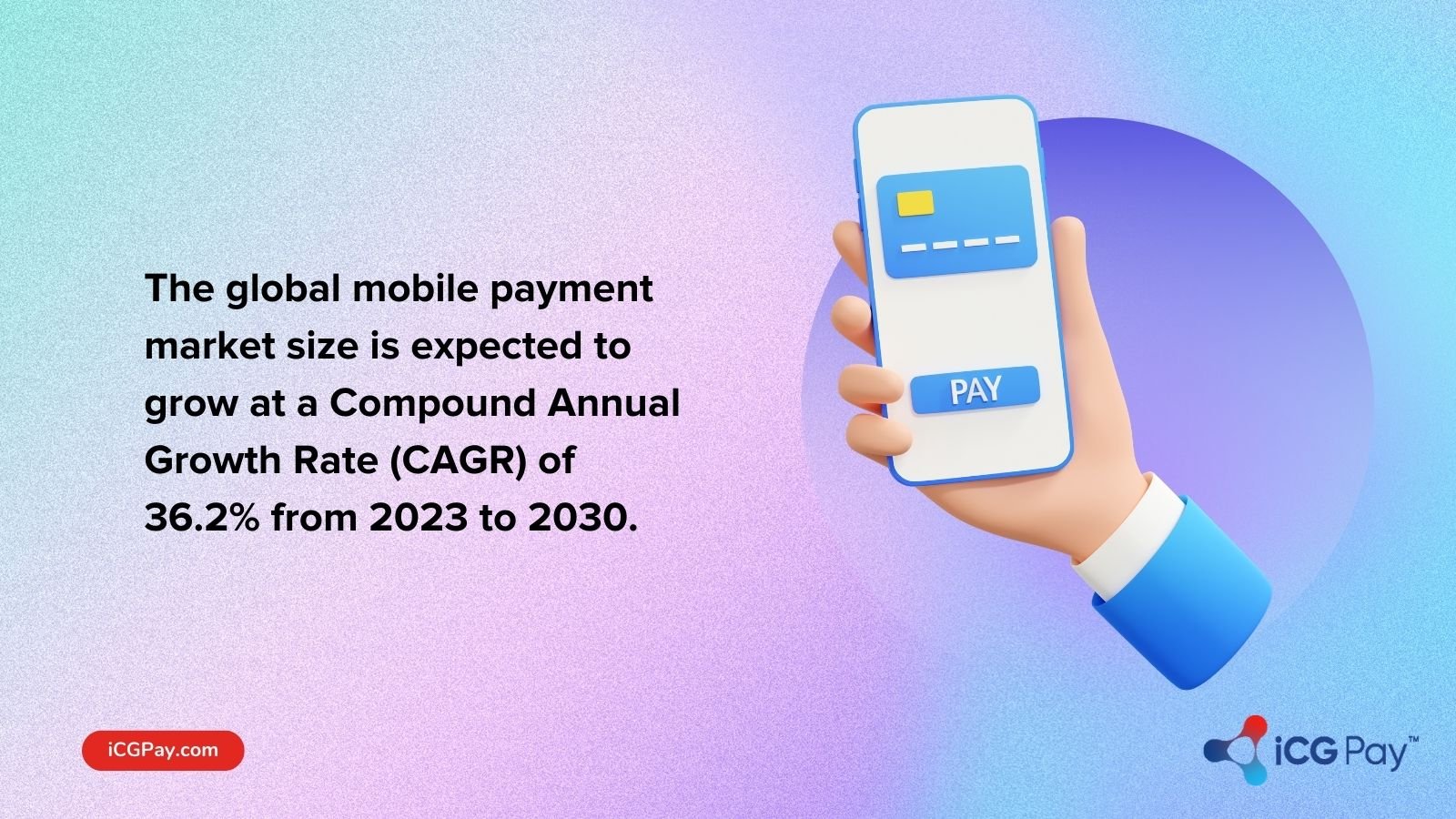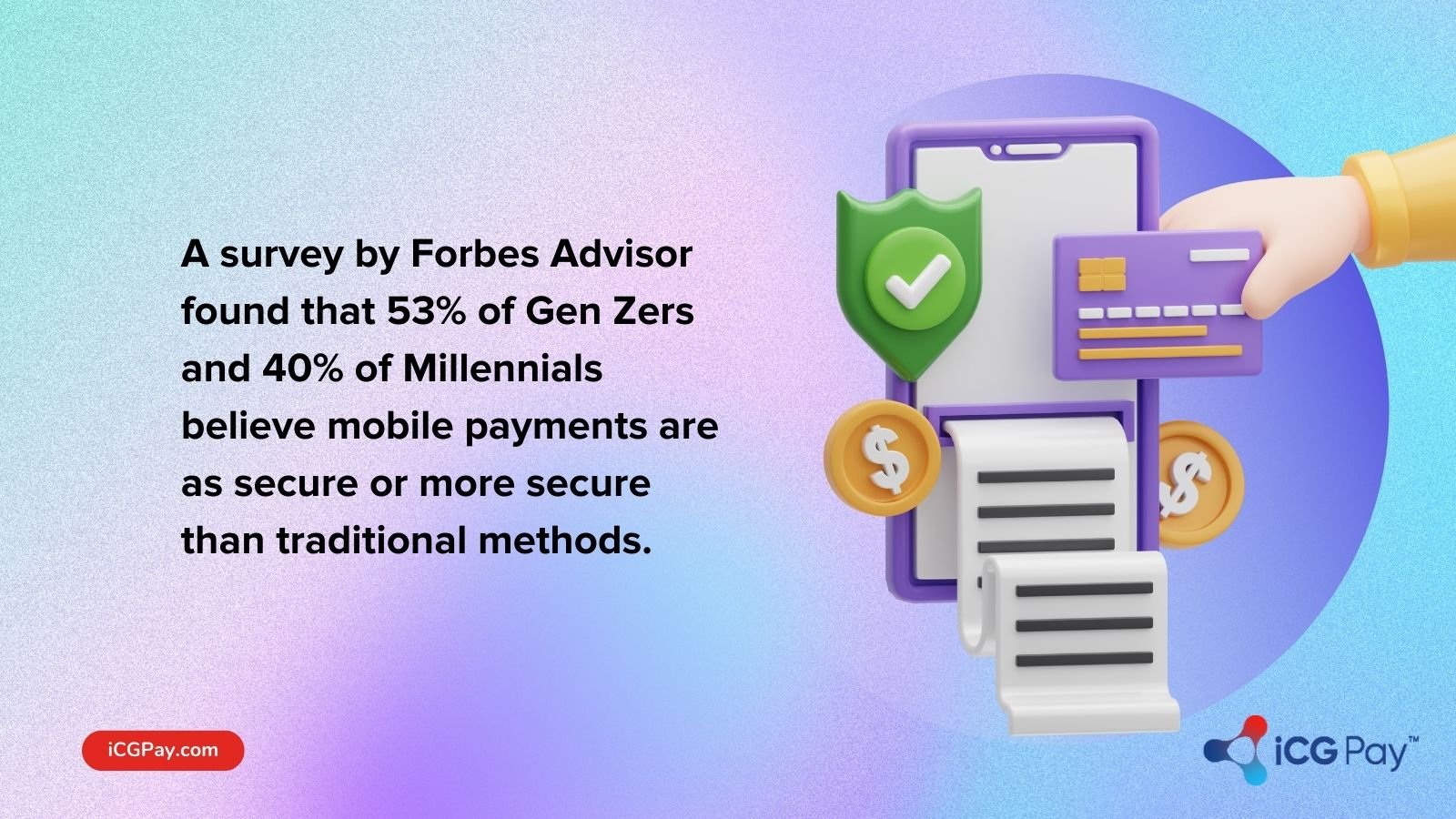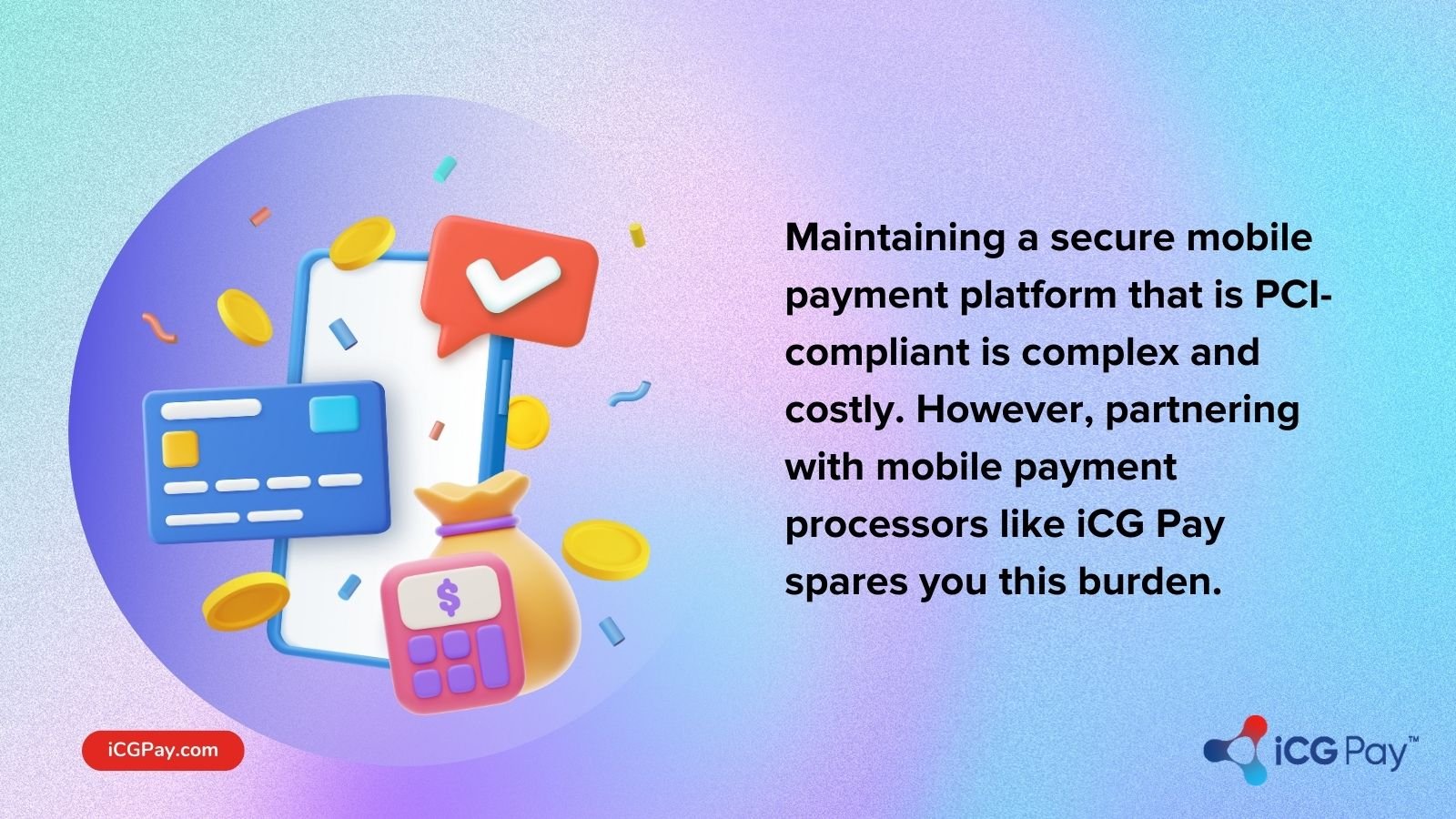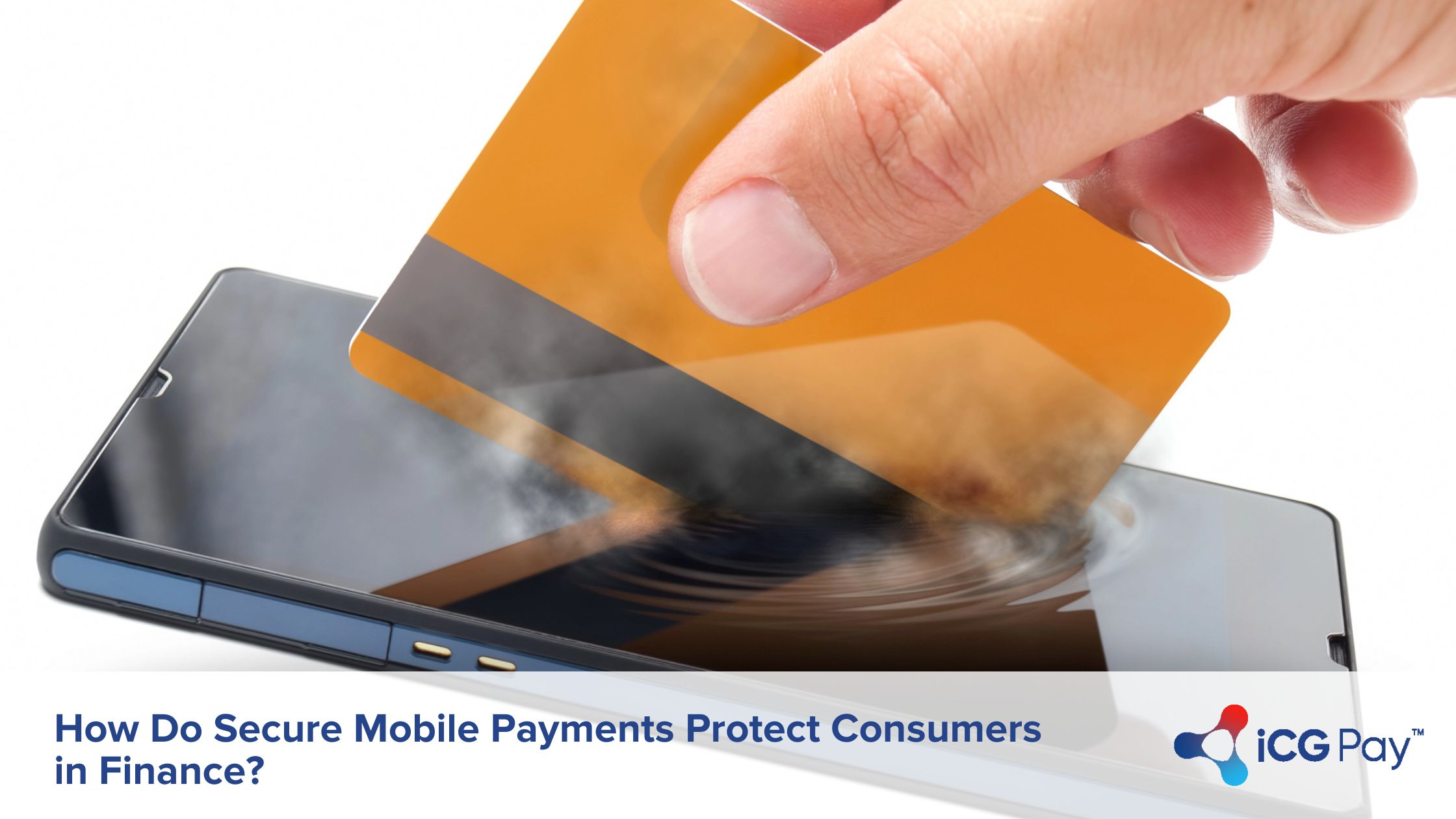Nowadays, you can securely purchase anything with a simple tap or wave of your phone. Mobile payments have surged into the mainstream.
The global mobile payment market size is expected to grow at a Compound Annual Growth Rate (CAGR) of 36.2% from 2023 to 2030.
But convenience is only one factor driving the shift toward mobile payments. As cybercrime becomes more sophisticated, consumers are understandably concerned about the security of their financial information.
So, how do mobile payments protect consumers' financial data and give them peace of mind? As a merchant or a financial institution, which payment provider should you look to partner with to protect your consumers?

What Makes Mobile Payments More Secure than Traditional Payment Methods?
Traditional payment methods, like using a physical credit or debit card, have vulnerabilities that mobile payments address.
Swiping or inserting your card may feel familiar. However, these methods expose your sensitive card information to potential fraud risks.
Mobile payments offer a fundamentally different approach to counter these threats and provide robust security.
Key security features found in mobile payments include:
1. Tokenization
Mobile payment processing utilizes tokenization in mobile payment applications to safeguard users' sensitive account information. Rather than directly transmitting or storing actual credit card numbers, tokenization substitutes this data with randomly generated symbols that serve as surrogates.
So, even if cybercriminals were to intercept this token, they can’t do anything with it. Tokens don't carry actual card information and can only be used for that specific transaction.
Since, as a merchant, you never receive or store your customers' real card numbers, this limits your exposure to the risks of data breaches on your end. Even if your system is compromised, the actual card details remain safe.
Leading solutions like iCG Pay, formerly known as iCheckGateway.com, implement advanced tokenization using artificial intelligence to create constantly shifting secure tokens across channels.
2. Encryption
Encryption uses complex mathematical algorithms to scramble your card data and transaction details. This makes it unreadable to anyone trying to intercept it during transmission.
Only authorized entities possess the special key needed to unscramble the encrypted data.
For mobile transactions, keys are securely stored in isolated hardware security modules. This adds a further barrier for cybercriminals attempting to decrypt any stolen data.
3. Biometric Authentication
Biometric authentication technologies like fingerprint, face, and even voice recognition provide convenience and heightened security for mobile payments.
Rather than relying solely on passwords, pins, or answers to security questions, biometric checks tied to mobile wallets and payment apps verify the user's identity.
Unlike passwords that can be guessed or stolen, consumers’ unique fingerprints or facial features are extremely difficult to replicate.
Biometric authentication is also often faster and more convenient than remembering passwords.
4. Advanced Fraud Detection
Sophisticated artificial intelligence and machine learning algorithms enable advanced fraud detection for mobile payments.
Payment processors use real-time transaction monitoring. Each purchase gets evaluated for hundreds of risk indicators like:
- User behaviors
- Device information
- Merchant patterns
This prevents most fraud attempts before any theft, information exposure, or account takeover can be achieved.
How Do Mobile Payments Protect Consumers in Finance?
A survey by Forbes Advisor found that 53% of Gen Zers and 40% of Millennials believe mobile payments are as secure or more secure than traditional methods.
Clearly, mobile payments offer a compelling combination of convenience and security, but the specific measures they use to protect consumers might seem a bit abstract.
Let's break down these features, demonstrating how they translate into tangible financial protection for consumers.

1. No Skimming
Skimming is a prevalent threat where criminals discreetly install devices on ATMs or on a POS terminal. These devices secretly capture your card's magnetic stripe data and PIN. Fraudsters then use these details to create counterfeit cards or steal funds.
How do mobile payments sidestep this risk?
- No Physical Swipe: Mobile payments use Near Field Communication (NFC) technology for contactless payments or QR code scanning. You don't physically swipe or insert your card, eliminating the opportunity for skimming devices to function.
- Tokenization: Even if skimming could occur in some hypothetical scenarios, the tokenization process renders the stolen data useless. Tokens can't be used to duplicate your card details.
- Mobile payments like Apple Pay and Google Pay have no physical card numbers or magnetic stripes for criminals to steal through skimmers.
By eliminating a common attack method, mobile payments make it harder for criminals to exploit consumers' personal information. This results in fewer unauthorized charges and the hassle of card replacement.
2. Reduced Data Exposure
Data breaches are a serious threat, especially when businesses store large amounts of customer card information.
Guidelines require that merchants, vendors, and other entities that store, process, or transmit cardholder data comply with Payment Card Industry Data Security Standards (PCI DSS).
With mobile payments, the potential fallout from these breaches is significantly reduced for consumers.
Instead of receiving your customers' actual card numbers, you only handle unique digital tokens. Even if your system is breached, your core financial data remains secure.
3. Real-Time Alerts
The immediacy of real-time alerts means you can catch potentially fraudulent charges as they happen.
Mobile payment apps leverage user account dashboards, email alerts, SMS text alerts, and push notifications to immediately inform consumers of important account actions.
These include:
- Login attempts
- New device registrations
- Payment transactions
- Balance changes
- Password/profile changes, etc.
Such real-time monitoring and alerts enable rapid response by users if fraudulent events are detected.
4. Remote Control
Remote control features, often found within mobile wallet apps, allow consumers to manage their connected cards and accounts even if they lose their phone.
If suspicious activity occurs, account holders can rapidly respond from their smartphone app without calling or visiting a bank.
Also, mobile payment providers can freeze affected user accounts globally if unrecognized purchases or account access occurs.
Does iCG Pay Offer Secure Mobile Payments?
Maintaining a secure mobile payment platform that is PCI-compliant is complex and costly. However, partnering with mobile payment processors like iCG Pay spares you this burden.
At iCG Pay, we handle your consumer card data.
Offloading PCI compliance onto us significantly reduces your risk profile and limits your liability in case of a potential breach.
Through iCG Pay, you can securely accept ACH, credit card transactions, and remote deposit capture (RDC).
Here are the mobile payment solutions we offer at iCG Pay:
- Flexible Payment Acceptance: Users can securely pay online via our Payment Gateway, in-person through EMV chip/magstripe readers, or remotely via eChecks or Remote Deposit Capture (RDC). Flexibility and choice help merchants meet consumer needs.
- End-to-End Encryption: Our point-to-point encryption from device to processor provides enterprise-grade security surpassing industry standards. No sensitive data touches merchant environments, greatly reducing breach risks.
- Tokenized Payments: We replace actual payment cards with secure tokenized stand-ins for authorization. This prevents the exposure of permanent financial credentials during transactions.
- Simplified Integration: Our developer-friendly SDKs, APIs, and documentation enable seamless embedding of our payment solutions into mobile apps and tech stacks.

Partner with iCG Pay for Secure Mobile Payments
Consumers are demanding mobile payments as they offer a secure payment method. With over four in five Americans using digital payments in 2021, it's clear that merchants, banks, credit unions, and utilities need to adapt to meet this expectation.
However, building customized in-house mobile payment infrastructure is expensive, time-consuming, and complex for PCI compliance.
The strategic move is partnering with industry-proven processors like iCG Pay instead.
iCG Pay handles the complexities of PCI compliance and utilizes cutting-edge security measures like tokenization and encryption. This lowers your risk and liability. Our solutions also seamlessly integrate with your existing systems, ensuring a smooth transition and minimal disruption.
Request a quote today to see how our mobile payment solutions can help you.




